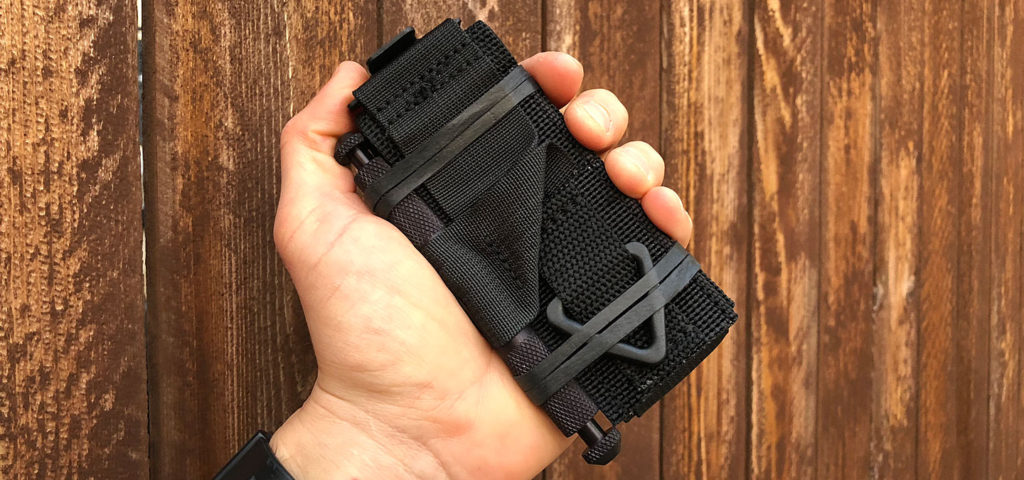Let’s begin this discussion with a caveat on tourniquets. Your belt isn’t an acceptable tourniquet and neither is a bandanna with a stick twisted in it. This is 2018; commercially available tourniquets are ubiquitous and have been proven over and over again to save lives. Don’t plan to improvise, plan to have a real tourniquet ready and available. Today I’ll be discussing how to properly apply and store a tourniquet.
The number one goal in treating any extremity hemorrhage (i.e. bleeding out) is to keep the blood in the body. The human body only has so much blood and while there’s no specific quantity that’s agreed upon for how much you can lose before you die, suffice it to say that you want to lose the least amount possible. Stopping the blood from leaving is paramount.
When it comes to tourniquet selection, I’d argue that your decision comes down to only two commercially available tourniquets, the SOF Tactical Tourniquet (SOFTT) and the Combat Application Tourniquet (CAT).
The CoTCCC (Committee on Tactical Combat Casualty Care) is a USSOCOM (United States Special Operations Command) body created to establish guidelines to properly train non-medics to treat preventable causes of death in the field. These are commonly referred to as the TCCC Guidelines and are updated on a fairly consistent basis. Within the guidelines, the CoTCCC only recommends the SOFTT and CAT Tourniquets.
It’s also been listed in the meeting minutes of the convening TCCC body that CAT tourniquets have broken when being applied. The most recent mention of this occurring was found within February 2014 meeting minute notes. While the CAT has been through design changes since this date and has also saved many lives, I feel it’s important to disclose that this is the reason ITS only carries the SOFTT.
Applying a Tourniquet
Orient the Tourniquet: The direction of pull to tighten the tourniquet should be towards the midline of the body. This is a good rule to remember and will make application easier if you have to apply a tourniquet on yourself one-handed. Picture an imaginary line running vertically up and down the center of the body; that’s your midline.
High as Possible: Always keep the tourniquet as high as possible on a limb; never on a joint.
Grab the Loop and Pull: Don’t get in the habit of grabbing the tail of the tourniquet to tighten it right away. By grabbing the loop and pulling it towards the midline, you’ll keep the tourniquet from spinning and control it better during one-handed application.
Pull the Tail: Take all the slack out of the tourniquet by pulling the tail to tighten it.
Manipulate the Base: If there’s still slack left in the tourniquet, or you can’t tighten it any further because of its position, grab the base and move it. Then take up the rest of the slack.
Tighten the Windlass: Continue turning the windlass until all bleeding stops, or is controllable/manageable. It doesn’t matter what color the blood is, tighten it until it stops.
Anchor the Windlass: Each side of the windlass has a groove that locks into the d-ring, preventing it from coming undone. Lock this in and ensure it’s locked in the windlass groove.
Time and Date: At the end of the tail, the SOFTT has as sewn in tag for writing in the time and date. A sharpie works great for this, but anything will do. It’s important to note this for higher echelon care, (i.e. hospitals) so that they know how long the tourniquet has been in place.
Practice: You should be able to deploy and apply your tourniquet in 12 seconds, one-handed. Practice until you can meet that goal each time. You’re also not going to ruin your tourniquet by practicing with it, just be sure you’re checking it after each practice session and if you see anything that’s damaged or has the potential to fail, replace your tourniquet.
Storing Your Tourniquet
Take Tourniquet Out of Wrapper: Don’t waste valuable time opening a package during a life saving situation!
Adjust the Strap Loop Size: There’s not a specific length to keep this measurement at, but there are pros and cons to each. A larger loop allows the tourniquet to fit over boots, etc. without having to unbuckle it. A shorter loop means there’s less slack to take up when pulling it tight.
Adjust Windlass Slack: The adjustable webbing used to tighten the tourniquet shouldn’t be so loose that it increases the time it takes to twist the windlass to stop bleeding.
Check the Buckle: Make sure the buckle is connected and creates a tight connection, but can still be unbuckled if necessary.
Fold up Webbing: At ITS, we’ve developed a method for folding the SOFTT that takes up the least amount of space, which we’ve dubbed Flat Folding. For more information, check out our video below.
Final Notes
This article shouldn’t be used as a replacement for medical training in the usage of a tourniquet. Seek training for yourself and your loved ones from competent trainers like our friends at Lone Star Medics.
A tourniquet is not a last resort! Purchase a tourniquet from a reputable resource to avoid fakes, get familiar with your tourniquet’s operation and know how to use it. A failure to plan is a plan to fail, so keep a tourniquet with you and be prepared to save a life.
